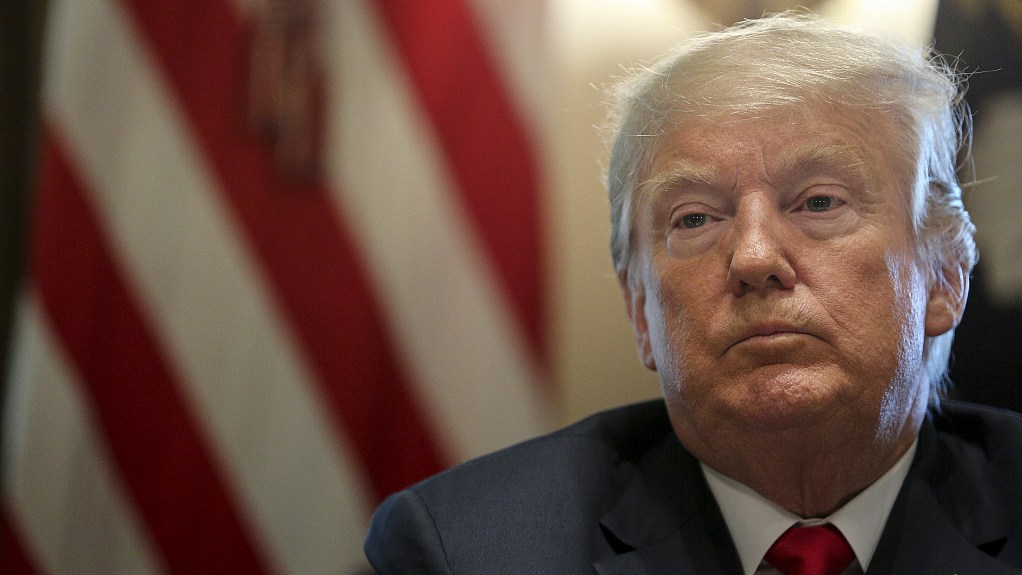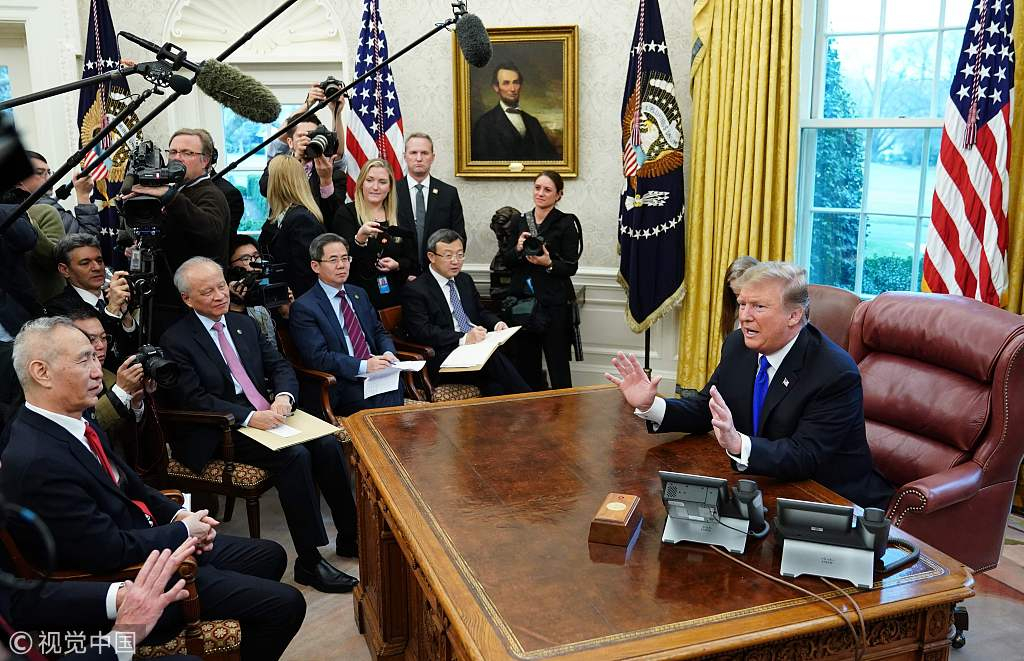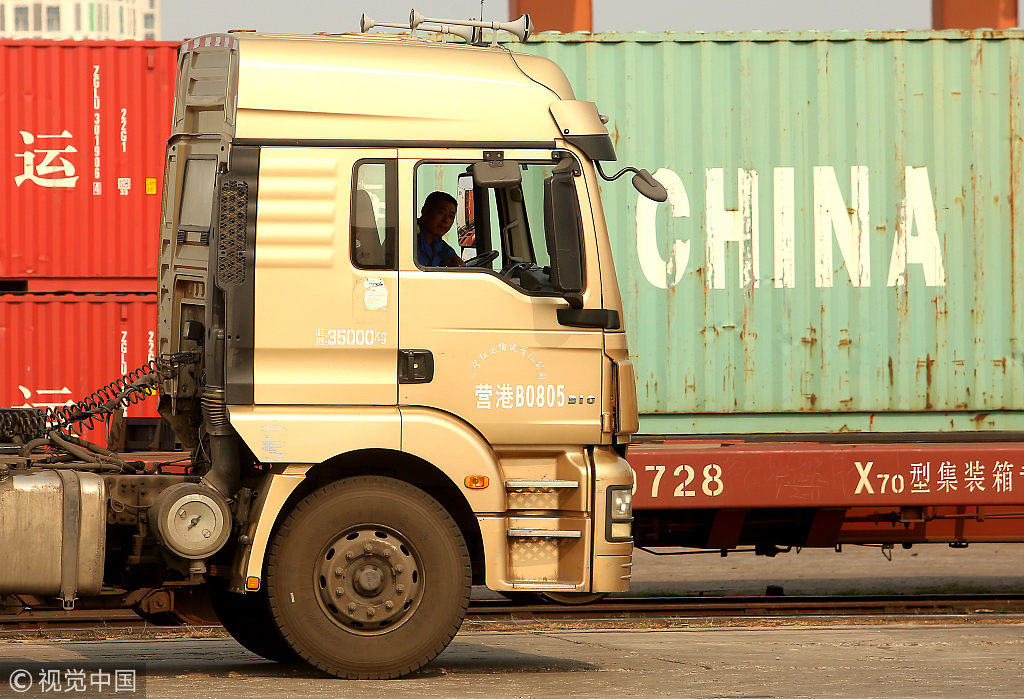
Opinion
19:41, 07-Apr-2019
How Trump’s trade war was ‘won’ and where it got us
Bobby Naderi

Editor's note: Bobby Naderi is a journalist, current affairs commentator, documentary filmmaker and member of the Writers Guild of Great Britain. The article reflects the author's opinion, and not necessarily the views of CGTN.
U.S. President Donald Trump's pointless and costly trade war with China appears to be close to completion. In this bizarre spectacle, Trump will declare "victory" with "significant breakthroughs" in his trade agreement with Beijing, which would be welcomed by American investors and workers. This "feat" and this "win," however, were not valid from the start.
It's a false promise, undeniably, because according to a new report by the International Monetary Fund (IMF), Trump has to end this trade war with China, anyhow. The IMF says a protracted trade war would severely damage the U.S. and Chinese economies but could also be a boon to countries like Canada and Mexico. The world's top two economies themselves would be the biggest losers in the event of a new hike in duties on all trade in goods.
The IMF report goes on to warn that "bilateral U.S.-China trade could fall by up to 30 percent in the short-term and by as much as 70 percent later on - taking sizable chunks out of both countries' economies."
The top line message is this: Right from the onset, this was a no-win trade conflict with China and the rest of the world community. There's no hope to level the playing field for American companies, even though U.S. and Chinese officials are in the home-stretch of negotiations to resolve their dispute.

U.S. President Donald Trump takes part in a meeting with China's Vice Premier Liu He (L) in the Oval Office of the White House in Washington, DC, February 22, 2019. /VCG Photo
U.S. President Donald Trump takes part in a meeting with China's Vice Premier Liu He (L) in the Oval Office of the White House in Washington, DC, February 22, 2019. /VCG Photo
Into the argument, macroeconomic factors -- not tariffs or lifting of tariffs -- will determine most of the changes in trade balance between the two countries.
According to the IMF, these shifting export relations would mean that, while the U.S. trade deficit with China would fall somewhat, there would be "no economically significant change in either country's overall trade balance."
On balance, China will continue to be the top exporter of electronics and machinery to the United States. Add to this the fact that if the two sides stretch the time frame, the IMF says, it would pose the biggest risk to global stability, where fiscal stabilization would be needed to respond to economic shocks in Europe and Asia.
Translation: This is no longer a matter for China and the United States. The unnecessary spat has affected the flow of billions of dollars of goods between the two biggest economies in the world, while slowing down the global economy. As a consequence, retail spending and manufacturing are down not just in China and the U.S., but across the globe, as investors are not willing to boost infrastructure spending to inflate growth.
If that's been the outcome already, Trump would do far better to end his no-win trade war with a deal, instead of an extension, or a tit-for-tat tariff battle, or taxing half of China's imports into the United States. All he needs to do is go through the IMF's new report that says, "Countries looking to reset trade imbalances should address issues in their own economies instead of implementing tariffs."
Here, Trump is desperate to "win," but he won't. He will only breed uncertainty in the U.S. agricultural and transportation equipment sectors, with "sizeable" losses in manufacturing, including job losses in China. His tariffs will also shift the trade balances with other countries, making no impact on China's aggregate balance.

Chinese truck drivers transport cargo containers to a port in Yingkou, a major port city in Liaoning Province, July 18, 2018. /VCG Photo
Chinese truck drivers transport cargo containers to a port in Yingkou, a major port city in Liaoning Province, July 18, 2018. /VCG Photo
It's a sentiment shared not just with the IMF, but many American trade organizations as well. They have similarly urged Trump not to escalate the conflict and impose more import tariffs, as it "poses a serious economic threat to the U.S. economy and the wellbeing of its auto industry." It would only drive manufacturing away from both countries and cause job losses.
Eight U.S. trade organizations have warned that implementation of new tariffs "will eliminate the growth in U.S. manufacturing, and the corresponding increase in jobs and investment.”
The positive: The IMF and the American trade organizations are calling on President Trump and his trade hawks to end their self-injurious trade and tariff wars with China and the European Union. The long-overdue, necessary and important decision is needed to save American manufacturers and jobs.
The negative: The outcome of a trade deal between China and the U.S. is already decided. It will not bring trade balance between the world's two largest economies. This is a painful reality. President Trump and his trade hawks have hit the bottom of the desperation barrel, where hope is unwilling to be fed in their doomed trade spat with China. In this no-win conflict, they have been flogging a dead horse and they all bear direct responsibility for the losses.
(If you want to contribute and have specific expertise, please contact us at opinions@cgtn.com)

SITEMAP
Copyright © 2018 CGTN. Beijing ICP prepared NO.16065310-3
Copyright © 2018 CGTN. Beijing ICP prepared NO.16065310-3